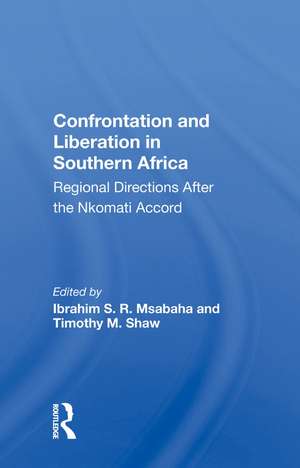Confrontation and Liberation in Southern Africa: Regional Directions After the Nkomati Accord
Editat de Ibrahim S. R. Msabahaen Limba Engleză Hardback – 9 apr 2020
| Toate formatele și edițiile | Preț | Express |
|---|---|---|
| Paperback (1) | 250.53 lei 6-8 săpt. | |
| Taylor & Francis – 31 oct 2022 | 250.53 lei 6-8 săpt. | |
| Hardback (1) | 502.66 lei 6-8 săpt. | |
| Taylor & Francis – 9 apr 2020 | 502.66 lei 6-8 săpt. |
Preț: 502.66 lei
Preț vechi: 691.58 lei
-27% Nou
Puncte Express: 754
Preț estimativ în valută:
96.19€ • 104.45$ • 80.80£
96.19€ • 104.45$ • 80.80£
Carte tipărită la comandă
Livrare economică 22 aprilie-06 mai
Preluare comenzi: 021 569.72.76
Specificații
ISBN-13: 9780367010690
ISBN-10: 0367010690
Pagini: 330
Dimensiuni: 146 x 229 mm
Greutate: 0.77 kg
Ediția:1
Editura: Taylor & Francis
Colecția Routledge
Locul publicării:Oxford, United Kingdom
ISBN-10: 0367010690
Pagini: 330
Dimensiuni: 146 x 229 mm
Greutate: 0.77 kg
Ediția:1
Editura: Taylor & Francis
Colecția Routledge
Locul publicării:Oxford, United Kingdom
Cuprins
Introduction: Southern Africa Before and After Nkomati -- Present Struggles in South Africa and Namibia -- Liberation Struggles in Southern Africa After Zimbabwe -- The Decolonization Process in Namibia -- Foreign Policy of Apartheid: From Settler Colonialism to State Capitalism and Neocolonial Corporatism -- The State of the Economies of Front Line States and the Liberation Struggle in Southern Africa -- Impact on the Front Line States’ Foreign Policy and Defense Policies -- The Nkomati Accord and Its Implications for the Front Line States and South Africa -- The Nkomati Agreement and the Future of the Second Phase of the National Liberation Struggles in Southern Africa -- Tanzania After the Nkomati Accord: Foreign Policy Restructuring in the Changing Strategic Balance in Southern Africa -- Regional Integration: SADCC and PTA -- Regional Economic Integration and the Liberation Struggle in Southern Africa -- The Implications of the Preferential Trade Area for Economic Integration in Eastern and Southern Africa -- SADCC in the Aftermath of the Nkomati Accord -- Legal and Institutional Aspects of Nkomati -- Marginal Notes on the Nkomati Accord: Unequal Treaties in International Law -- Peace and Security in Southern Africa: Legal Aspects -- Conclusion: Total Strategy in Southern Africa— An Analysis of South African Regional Policy Since 1978 -- Nkomati Accord, Signed Between Mozambique and South Africa, March 1984 -- OAU and the Diplomacy of Decolonization -- Speech by Hon. V. M. Makhele, Minister for Foreign Affairs, Kingdom of Lesotho -- Speech by Hon. Dr. Naomi P. Nhiwatiwa, Deputy Minister of Information, Posts and Telecommunications, Republic of Zimbabwe
Descriere
The 1984 "Nkomati Accord"—a bilateral security agreement between South Africa and Mozambique to eliminate guerrilla threats on both sides of a common border—was a milestone in regional confrontation and cooperation. Yet, the real challenge to the white South African regime is not external; it is internal opposition to apartheid. This volume, written by leading African scholars, begins by exploring the origins of racism and nationalism in Southern Africa. The contributors discuss the spread of nationalist movements throughout the region, arguing that South Africa has attempted to resist, divert, or undermine the domino effect by capitalizing on the Nkomati Accord. The authors focus on the legal aspects of the Accord, its impact on the foreign and defense policies of the Front Line States, prospects for regional development and economic integration, and potential outcomes of the national liberation struggles in Southern Africa.
